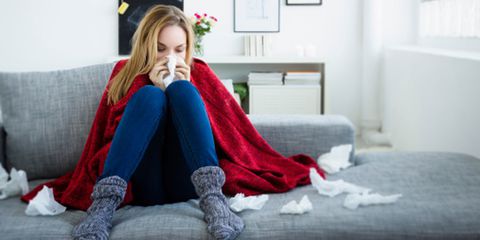Influenza or seasonal flu is basically a viral infection. It is different from common flu that accounts for many conditions that occur due to changing weather. These conditions include cold, stomach problems and fever. Influenza or flu comes with a variety of symptoms and is primarily caused by a virus due to lack of precautions taken as far as food and outings go, during the changing seasons. Let us find out more about the symptoms and treatment.
Symptoms: The main symptoms of this condition include fever, an aching body, dullness, fatigue, dry hacking coughs, a sore throat and even headaches. Appetite loss and drowsiness are also some symptoms of the condition.
Causes: Influenza is usually caused by either of the two influenza viruses, such as virus A or Virus B. The strains of these viruses are known to change every year.
Congestion: The main form of treatment revolves around treating the congestion that may have occurred in the nasal or the sinus tracts. The treatment for this is usually done with the help of nasal decongestants or sprays which can be used for a few days to get relief until the infection and congestion leaves the body. One must avoid the use of these decongestants for prolonged periods of time as they can make the condition reoccur again and again.
Allergies: Histamine is the chemical that the body produces automatically when an allergy hits. This is what causes influenza and hay fever as well. One can get treated with the help of anti-histamine drugs that will be prescribed for the doctor in case an allergic reaction or hay fever is detected. This drug can cause severe drowsiness, so it is best to take it at night and wake up fresh in the morning.
Blood Pressure and Other Complications: It is important to know what kind of medication you are allergic to, before you ingest anything or take a spray. If you are suffering from high blood pressure or any other cardiovascular complications, then you may want to steer clear of decongestants as these sprays can increase the blood pressure as well as the heart rate of the patient.
Cough: In order to cure a cough, one can take a cough medicine that will also have anti-histamines and analgesics, which will help in clearing the pollutants, dirt and allergens that have caused the cough.
Fever: In case you are experiencing fever and body ache, you can take aspirin or acetaminophen. However, this should be avoided by children.
With the treatment, one should take ample precautions while stepping out the home. Also, the patient should be careful about the dosage to avoid an overdose.
Menstruation is a healthy experience of a woman’s life, and it must come habitually every 28 days, for a period of 3-4 days without coagulating, and the blood loss should correspond to about a quarter of a cup. For a woman, menstrual cycle is a virtuous indicator of her overall wellbeing. Some women get irregular periods that appear at longer intervals, an unpredictable discrepancy in the duration of the cycle and the normal twenty-eight day cycle is missing. Some women have very insignificant problems with menstrual cycles, while others experience a monthly torture.
Irregular menses is typical in early puberty and not generally perturbing. Women should be alarmed when periods are spaced out for more than two months, as this may suggest hormonal imbalance and ovulation problems. A woman’s customary hormonal cycle is contingent upon a subtle equilibrium between different hormones. Several potential triggers can stimulate hormonal imbalance leading to irregular menses. If a woman fails to ovulate, her ovaries will not receive a signal to produce a hormone called progesterone. Progesterone is essential in regulating the Uterine lining called endometrium, which is discarded during menstruation. Without progesterone, the endometrium persistently grows until it starts to break down and is disposed off as a very heavy uterine bleeding. The endometrium may also shed partially and intermittently, and bleeding becomes irregular or prolonged.
Causes of Irregular Menses:
Puberty.
Birth control pills.
Stress.
Poor diet due to anorexia, bulimia can influence your hormones.
Excessive weight loss or gain.
Intense exercise.
Breast-feeding.
Anxiety regarding pregnancy.
Anemia.
Menopause.
Excessive production of Androgen (a steroid hormone such as testosterone that controls the development and maintenance of masculine characteristics).
Uterine fibroids, cysts, polyps.
Polycystic Ovarian Syndrome (in this condition the ovary does not make all the hormones needed for any egg to mature fully, due to which some follicles remain as cysts, ovulation does not occur and the hormone progesterone is not made. Without progesterone a woman’s menstrual cycle is irregular or absent).
Endometriosis (this is a condition where cells similar to those found inside the uterus grow and are attached outside the uterus forming implants. This can lead to infertility and irregular menses).
Pelvic infection.
Ovarian cancer.
Inflammatory Bowel disease.
Thyroid disease.
Heart disease.
Symptoms of Irregular Menses:
Inconsistency in the length of menstrual cycle.
Acne.
Bloating.
Low energy levels.
Sore breasts.
Fever.
Chills.
Changes in sexual desire.
Infertility.
Depression.
Osteoporosis.
Uterine cancer.
Endometrial Hyperplasia (excessive cell growth in the inner lining of the uterus due to excessive estrogen production as a result of delayed ovulation).
Homeopathic Approach to Irregular Menses:
Homeopathy offers an extensive range of options than conventional medicine. Homeopathic treatment for Irregular Menstruation is very competent, non-invasive, safe and inexpensive. Homeopathy treats the patient as a whole and looks deeper into the problem, promotes the immune function and maintains uterine health by eliminating the causative factor. Homeopathic Constitutional treatment based on the holistic approach stimulates the natural hormonal balance without administering any harmful hormone preparations. The goal of this Homeopathic approach is to enliven the body's natural healing and self-repair ability to treat the underlying condition, to prevent it and to create the highest state of health and well-being.
Constitutional Homeopathic treatment with the management of an experienced and professional Homeopath is an excellent choice for Irregular Menstruation. Some Homeopathic remedies that are commonly used to treat Menstrual Irregularities are given below. These are just a few of the commonly used Homeopathic remedies and are mentioned only to create awareness about the effectiveness of Homeopathic medicines in Menstrual Irregularity. It is not advisable to resort to self-medication for any disease.
Homeopathic remedies for Irregular Menses:
Pulsatilla: Pulsatilla is one of the first remedies thought of, in affection, peculiar to women. It's essentially feminine disposition of gentleness timidity, mildness, docility – “excellent thing in woman” – is most characteristic of the drug; even tearfulness, another feminine attribute, strongly points to Pulsatilla. Then, we have fickleness, indecision and changeableness, which are certainly characteristic of Pulsatilla and of some women. Dark menses which are delayed and accompanied with this severe menstrual colic and the characteristic temperament will be the indications. The menses of Pulsatilla, besides being scanty, are quite apt to appear too late.
Caulophyllum: This is a valuable remedy in treating irregular periods, difficulty becoming pregnant or slow childbirth due to weak muscle tone of the uterus. The patient feels menstrual discomfort with heavy bleeding and drawing pains in the pelvic region, thighs, and legs. These patients complain of habitual abortion due to uterine debility.
Cimicifuga Racemosa: This remedy is intended for irregular and painful menses, with shooting pains that go down the hips and thighs, or cramps similar to labor-pains that are felt in the pelvic area. Women become restless, fearful, and depressed before a menstrual period. These women are strong, talkative, depressed, they try to injure themselves, and have dreams of impending evil, with fear of riding in a closed carriage.
Lachesis: This remedy is suggested to women who are passionate, with a tremendous need for an outlet, both physically and mentally. The menstrual flow is irregular, heavy and brings relief of tension. These patients are very outspoken with strong feelings of suspicion or jealousy. They have an intolerance of restrictive clothing around the waist or neck.
Lycopodium: This is an outstanding remedy for delayed menses that follows a heavy flow lasting more days. These patients have a ravenous appetite with a strong craving for sweets. They complain of abdominal bloating and flatulence, and always have a worried look with lack of confidence, though they may be bossy with their family.
Murex Purpurea: This remedy works amazingly in Irregular Menstruation with large clots and feeling of protrusion. These patients feel very weak, are very conscious of a womb, and feel as if something is pressing on a sore spot in the pelvis. This sore feeling is worse on sitting, hence the patient always sits with legs tightly crossed. Least contact of parts causes violent sexual excitement in these women.
Secale Cornutum: This is a useful remedy for Irregular menses in thin, shriveled skinned women. Their whole body is pervaded by a sense of great heat and they have burning pains in the uterus. Menses is irregular, dark and at times, there is continous oozing of watery blood until the next period. Their pregnancy concludes in a threatened abortion in the third month
Sepia: This remedy is best suited to women who feel weary and dragged-out, and are indifferent to their own family members. She feels taken for granted and overworked, becomes irritable and sarcastic if demands are made. Menses is delayed with a feeling that the pelvic floor is weak, or as if the uterus is sagging.
Self-care measures for Irregular Menses:
Relax and ease stress.
Avoid exhausting physical exercise.
Eliminate any eating disorders.
Eat a balanced diet with lots of fresh fruits and vegetables.
Reduce your intake of salt and caffeine.
Hence, appreciate a natural way to a healthy uterus, convalesce healthy living and curtail the changes that happen during your menstrual years.
Menstrual disorders are caused by a variety of factors and affect every woman in a different manner. In most cases, it manifests itself in the form of fluctuations in menstrual flow and irregularity in the monthly cycle. Certain disorders are not too severe and can be easily alleviated. Others are more complicated and require the immediate attention of a gynecologist.
As mentioned, there are different specific causes of different kinds of disorders resulting from a range of factors such as hormone levels, functioning of the central nervous system, health of the uterus, etc.
Some of the most common causes of menstrual disorders are as follows:
Hormonal imbalance: Fluctuating hormone levels in the body have a direct impact on the menstrual cycle. These fluctuations can be caused by dysfunction in the pituitary gland, thyroid gland or adrenal gland. It can also be a result of malfunction in either or both ovaries and the secretion of hormones originating there.
Anatomic problems: One fourth menstrual disorders are caused by problems of the anatomy. These include various gynecological issues like the presence of uterine fibroids and polyps, reduced uterine contractile strength, adenomyosis (intrusion of uterine tissue into the muscular wall of the uterus), a uterus with an excessively large surface area, and endometrial cancer.
Clotting irregularities: Abnormality in clotting is a cause of heavy menstrual bleeding in women. It leads to exceeding blood loss from minor cuts and gashes and makes one easily prone to bruising. This may also include medical conditions such as thrombocytopenia (platelet dysfunction) and Von Willebrand disease.
Medications and supplements: There is a wide range of medications and nutritional or hormonal supplements which often cause menstrual disorders in women and lead to fluctuations in the menstrual cycle. These include medicines such as aspirin, ibuprofen, estrogen pills, Vitamin E supplements etc.
Miscellaneous factors: These are comparatively rare and require a greater degree of medical attention. It includes conditions such as cervical cancer, ovarian tumors, liver and kidney diseases, uterine infections, extreme psychological stress, obesity, etc. Incidents such as miscarriages and unsuspected pregnancies are also known to cause abnormal menstrual bleeding.
Reflexology says that foot massage aids in releasing the blocks that hold the energy from flowing through the body. Known by the name, Padabyang in Ayurveda, the massaging of the feet at specific points have many health benefits, and at the same time, helps in the curing of some diseases as well. Ayurveda considers feet massage as a beneficial therapy that offers amazing health benefits.
What are the advantages of feet massaging at night?
Any kind of massage contributes to enhancing your well-being and feet massage is no different. The massaging of the feet at night without fail has several benefits that are as enumerated below:
Relaxation: Massaging the feet at night gives a perfect relaxation and helps you to cope with the long and tiring day. It is simply a great way for the reduction of stress and feels relaxed.
Improving blood circulation: We all know that a good blood circulation is an essence of maintaining good health. If blood cannot circulate freely, it may give rise to many health problems. A foot massage at the specific point before going to bed significantly helps in the improvement of the flow of blood.
Good sleep: Massaging the feet at night plays a crucial role in having a good night’s sleep which is extremely beneficial for good health.
Reduce PMS: Pre Menstrual Syndrome abbreviated as PMS is a difficult battle that all women have to deal with. PMS causes a lot of pain accompanied by a lot of physical changes. To effectively deal with PMS feet massaging at night is an excellent option.
Reduce pains and aches: Massaging the feet every night before going to bed is a very effective way in the reduction of various types of pains and aches of the body. A proper and regular massage is recommended in this situation for more effective relief from pains.
Good for headaches and migraines: Another amazing benefit of feet massaging at night is that it helps to give you a great relief from headaches and migraines. It gives you a quick relief and most importantly without taking any medicines or having to face any other side effects.
Reduces heel pain: Many experience difficulties with heel pain in the morning after waking up. Feet massage at night before going to bed is a great way for the reduction of pain in the heels. At the same time, it also helps to deal with pain from flat feet.
Fights depression: A feet massage at night time also helps to fight depression effectively, and in this case, it is recommended to give a self-massage.
Thus, a foot massage at night is highly beneficial, and Ayurveda encourages massaging with oil as the benefits are multiplied when the foot is massaged with medicated oils.
For an expecting mother, nothing is more important than the safety and well-being of her unborn child.
Read on to find out the 4 things pregnant women must avoid at all costs in order to have a safe pregnancy.
Abdominal X-rays: Abdominal X-rays during pregnancy are a big no. This kind of X-ray exposes the abdomen of the mother, and the baby as a consequence, to high levels of radiation, which can cause changes in the baby's rapidly growing cells. As a result, the baby's chances of suffering from birth defects or certain cancers, such as leukaemia later on in life, increase rapidly. It is best to avoid X-rays until absolutely necessary. However, you must avoid self meditation.
Alcohol: All types of alcohol must be avoided during pregnancy. Consumption of alcohol during these 9 months has been associated with several birth defects such as poor growth, learning disabilities and mental retardation. In worst case scenarios, excessive alcohol consumption during pregnancy can lead to what is known as Foetal Alcohol Syndrome or FAS, which severely affects the mental development and physical growth of the unborn child, particularly of the face and skull. Also, you must quit smoking.
Caffeine: It's wise to avoid coffee, tea or even sodas that contain caffeine, as it can adversely affect the baby's heart rate. Some studies go on to suggest that the consumption of caffeine may even increase the risk of miscarriages. Not only that, the intake of caffeine by the mother can increase the chances of the baby getting diabetes. So anything that contains caffeine must be avoided at all costs.
Heavy exercising: While moderate exercising during pregnancy is very healthy for both the baby and the mother, extreme exercising can give rise to quite a few complications. Exercises, which cause the heart rate of the mother to exceed the mark of 160 bpm (beats per minute) may result in the supply of less oxygen to the baby. This can lead to foetal hypoxia, a condition in which the supply of oxygen to the brain of the baby is restricted, resulting in brain damage. Exercises that must be avoided include abdominal crunches, exercises that hurt the mother's joints or strain her back or which require her to hold her breath for too long.











